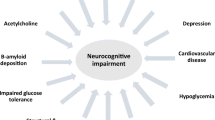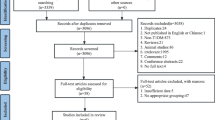Abstract
Introduction
Type 1 diabetes (T1DM) is associated with cognitive deficits, and age at diagnosis is thought to play a substantial role. However, there are limited data for the cognitive performance in young adults, in relation to the age of diabetes onset. The lack of information is particularly striking in the context of developing regions.
Methods
This cross-sectional study was performed from August 2018 to July 2020. We included adult participants with T1DM, stratified by the age of diabetes onset (till 6 years of age, between 7 to 12 years of age, and 13 to < 18 years of age) and compared them with the control group (no diabetes or pre-diabetes). We filled a structured case record proforma for all participants and recorded relevant socio-demographic and medical details. Detailed neuropsychological assessment with 13 psychological tests representing four cognitive domains was carried—(1) attention, working memory and executive functions; (2) learning and memory; (3) visuoperceptual functions; and (4) information processing speed.
Results
We evaluated 100 individuals, 73 (men 48.0%) with T1DM and 27 (men 51.9%) without T1DM. After adjustment for age, gender and education, the mean differences in composite Z scores (for the four cognitive domains) between participants with T1DM and without T1DM were 0.08 for attention, working memory and executive functions (p = 0.614); 0.07 for learning and memory (p = 0.694); 0.05 for visuoperceptual (p = 0.784); and 0.22 for information processing speed (p = 0.305). No significant differences were found for the three subgroups of individuals with T1DM, when compared with the control group. Effect size (Cohen's d) for the individual tests (n = 13) ranged from − 0.36 to + 0.39, and none of the comparisons were statistically significant. Amongst the participants with T1DM, higher education had a significant positive association with three of the four cognitive domains evaluated.
Conclusions
To conclude, our findings suggest minimal differences in the cognitive functioning of patients with T1DM with different age of onset of diabetes compared to healthy controls, when evaluated in early adulthood. This is possibly the first study from South Asia with an in-depth and comprehensive assessment of cognitive functions in patients with T1DM, using a detailed neuropsychological battery.

Similar content being viewed by others
References
Cameron FJ, Northam EA, Ryan CM. The effect of type 1 diabetes on the developing brain. Lancet Child Adolesc Health. 2019;3:427–36.
Gaudieri PA, Chen R, Greer TF, Holmes CS. Cognitive function in children with type 1 diabetes: a meta-analysis. Diabetes Care. 2008;31:1892–7.
Naguib JM, Kulinskaya E, Lomax CL, Garralda ME. Neuro-cognitive performance in children with type 1 diabetes–a meta-analysis. J Pediatr Psychol. 2009;34:271–82.
Tonoli C, Heyman E, Roelands B, Pattyn N, Buyse L, Piacentini MF, Berthoin S, Meeusen R. Type 1 diabetes-associated cognitive decline: a meta-analysis and update of the current literature. J Diabetes. 2014;6:499–513.
Brands AMA, Biessels GJ, de Haan EHF, Kappelle LJ, Kessels RPC. The effects of type 1 diabetes on cognitive performance: a meta-analysis. Diabetes Care. 2005;28:726–35.
Chaytor NS, Barbosa-Leiker C, Ryan CM, Germine LT, Hirsch IB, Weinstock RS. Clinically significant cognitive impairment in older adults with type 1 diabetes. J Diabetes Compl. 2019;33:91–7.
Nunley KA, Rosano C, Ryan CM, Jennings JR, Aizenstein HJ, Zgibor JC, Costacou T, Boudreau RM, Miller R, Orchard TJ, Saxton JA. Clinically relevant cognitive impairment in middle-aged adults with childhood-onset type 1 diabetes. Diabetes Care. 2015;38:1768–76.
Nunley KA, Ryan CM, Orchard TJ, Aizenstein HJ, Jennings JR, Ryan J, Zgibor JC, Boudreau RM, Costacou T, Maynard JD, Miller RG, Rosano C. White matter hyperintensities in middle-aged adults with childhood-onset type 1 diabetes. Neurology. 2015;84:2062–9.
Ryan JP, Aizenstein HJ, Orchard TJ, Ryan CM, Saxton JA, Fine DF, Nunley KA, Rosano C. Age of childhood onset in type 1 diabetes and functional brain connectivity in midlife. Psychosom Med. 2015;77:622–30.
Chaytor NS, Riddlesworth TD, Bzdick S, Odegard PS, Gray SL, Lock JP, DuBose SN, Beck RW. T1D exchange severe hypoglycemia in older adults with type 1 diabetes study group the relationship between neuropsychological assessment, numeracy, and functional status in older adults with type 1 diabetes. Neuropsychol Rehabil. 2017;27:507–21.
Cameron FJ. The impact of diabetes on brain function in childhood and adolescence. Pediatr Clin North Am. 2015;62:911–27.
Li W, Huang E, Gao S. Type 1 diabetes mellitus and cognitive impairments: a systematic review. J Alzheimers Dis. 2017;57:29–36.
Definition and Diagnosis of Diabetes Mellitus and intermediate hyperglycemia. Available from https://www.who.int/diabetes/publications/Definition%20and%20diagnosis%20of%20diabetes_new.pdf. Accessed on December 25, 2021.
Graveling AJ, Deary IJ, Frier BM. Acute hypoglycemia impairs executive cognitive function in adults with and without type 1 diabetes. Diabetes Care. 2013;36:3240–6.
Sommerfield AJ, Deary IJ, Frier BM. Acute hyperglycemia alters mood state and impairs cognitive performance in people with type 2 diabetes. Diabetes Care. 2004;27:2335–40.
Biessels GJ, Deary IJ, Ryan CM. Cognition and diabetes: a lifespan perspective. Lancet Neurol. 2008;7:184–90.
Ly TT, Anderson M, McNamara KA, Davis EA, Jones TW. Neurocognitive outcomes in young adults with early-onset type 1 diabetes: a prospective follow-up study. Diabetes Care. 2011;34:2192–7.
Lin A, Northam EA, Rankins D, Werther GA, Cameron FJ. Neuropsychological profiles of young people with type 1 diabetes 12 yr after disease onset. Pediatr Diabetes. 2010;11:235–43.
Franceschi M, Cecchetto R, Minicucci F, Smizne S, Baio G, Canal N. Cognitive processes in insulin-dependent diabetes. Diabetes Care. 1984;7:228–31.
Ding X, Fang C, Li X, Cao YJ, Zhang QL, Huang Y, Pan J, Zhang X. Type 1 diabetes-associated cognitive impairment and diabetic peripheral neuropathy in Chinese adults: results from a prospective cross-sectional study. BMC Endocr Disord. 2019;19:34.
Diabetes Control and Complications Trial/Epidemiology of Diabetes Interventions and Complications Study Research Group, Jacobson AM, Musen G, Ryan CM, Silvers N, Cleary P, et al. Long- term effect of diabetes and its treatment on cognitive function. N Engl J Med. 2007;356:1842–52.
Jacobson AM, Ryan CM, Braffett BH, Gubitosi-Klug RA, Lorenzi GM, Luchsinger JA, Trapani VR, Bebu I, Chaytor N, Hitt SM, Farrell K, Lachin JM; DCCT/EDIC Research Group. Cognitive performance declines in older adults with type 1 diabetes: results from 32 years of follow-up in the DCCT and EDIC Study. Lancet Diabetes Endocrinol. 2021;9:436–45.
Lin A, Northam EA, Werther GA, Cameron FJ. Risk factors for decline in IQ in youth with type 1 diabetes over the 12 years from diagnosis/illness onset. Diabetes Care. 2015;38:236–42.
Livingston G, Huntley J, Sommerlad A, Ames D, Ballard C, Banerjee S, et al. Dementia prevention, intervention, and care: 2020 report of the Lancet Commission. Lancet. 2020;396:413–46.
Patiño-Fernández AM, Delamater AM, Applegate EB, Brady E, Eidson M, Nemery R, et al. Neurocognitive functioning in preschool-age children with type 1 diabetes mellitus. Pediatr Diabetes. 2010;11:424–30.
Albanese E, Launer LJ, Egger M, Prince MJ, Giannakopoulos P, Wolters FJ, et al. Body mass index in midlife and dementia: Systematic review and meta-regression analysis of 589,649 men and women followed in longitudinal studies. Alzheimers Dement. 2017;8:165–78.
Brismar T, Maurex L, Cooray G, Juntti-Berggren L, Lindström P, Ekberg K, et al. Predictors of cognitive impairment in type 1 diabetes. Psychoneuroendocrinology. 2007;32:1041–51.
Acknowledgements
The author thank study participants for generously donating their time and information.
Author information
Authors and Affiliations
Corresponding authors
Ethics declarations
Funding
This project was funded by Department of Science and Technology with grant No. SR/CSRI/162/2016 to Yashdeep Gupta as the Principal Investigator. No sponsorship of funding was received for the publication of this article.
Authorship
All named authors meet the International Committee of Medical Journal Editors (ICMJE) criteria for authorship for this article, take responsibility for the integrity of the work as a whole, and have given their approval for this version to be published.
Author Contributions
YG and AG conceptualised this research. The first draft was written by VD, AG and YG. VD, BK, SSK, AN and YG were involved in execution of this work. MK helped with statistical part. NT provided the overall supervision and helped in providing inputs in planning and patient recruitment. RS provided inputs in the planning stage. All authors helped in editing and provided the final approval of this manuscript for publication. YG is the guarantor of this work and has full access to the data.
Disclosures
Vinay Dogra, Bhavika Mittal, S. Senthil Kumaran, Ashima Nehra, Rajesh Sagar, Anu Gupta, Mani Kalaivani, Yashdeep Gupta, and Nikhil Tandon have nothing to disclose.
Compliance with Ethics Guidelines
The study was approved by the institutional ethics committee (Ref No. IEC-585/05.01.2017, RP-52/2017, dated 29th March, 2017) and informed consent was obtained from all participants. The study was conducted in accordance with the International Conference on Harmonisation Guidelines for Good Clinical Practice and the Declaration of Helsinki.
Data Availability
The datasets generated during and/or analysed during the current study are available from the corresponding author on reasonable request.
Supplementary Information
Below is the link to the electronic supplementary material.
Rights and permissions
About this article
Cite this article
Dogra, V., Mittal, B., Senthil Kumaran, S. et al. Evaluation of Cognitive Deficits in Adults with Type 1 Diabetes Stratified by the Age of Diabetes Onset: A Cross-Sectional Study. Adv Ther 39, 1711–1723 (2022). https://doi.org/10.1007/s12325-022-02063-y
Received:
Accepted:
Published:
Issue Date:
DOI: https://doi.org/10.1007/s12325-022-02063-y




